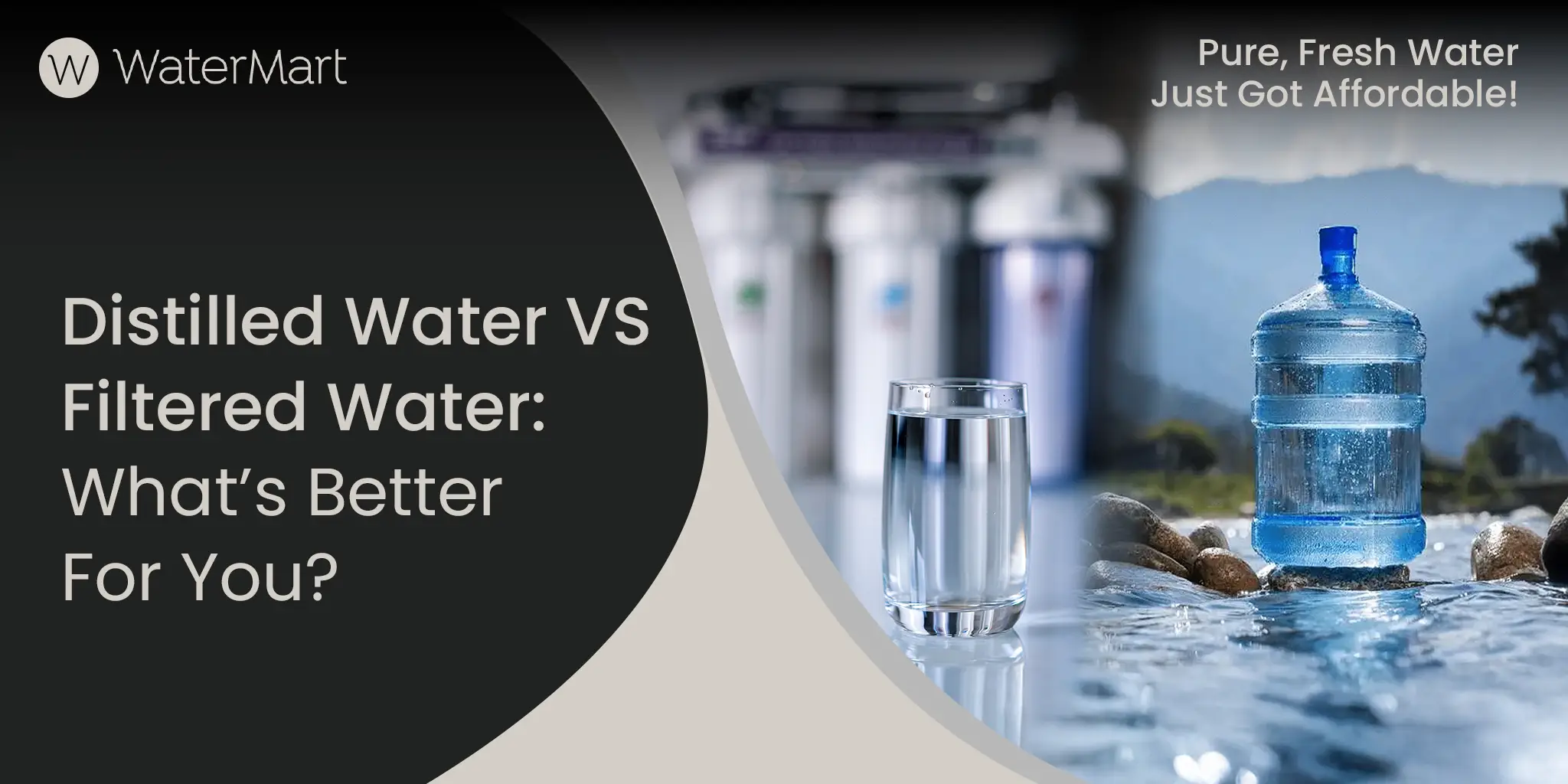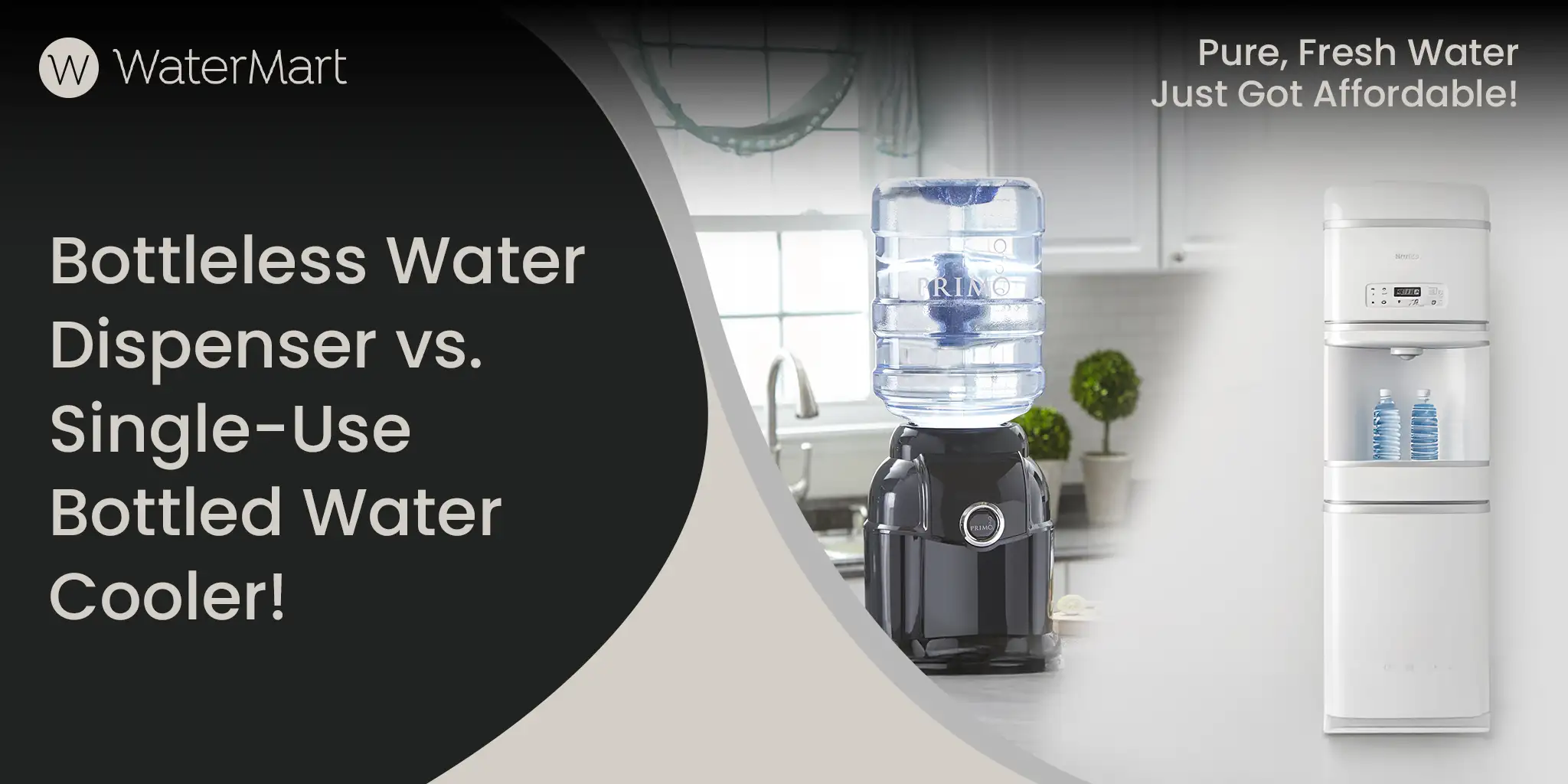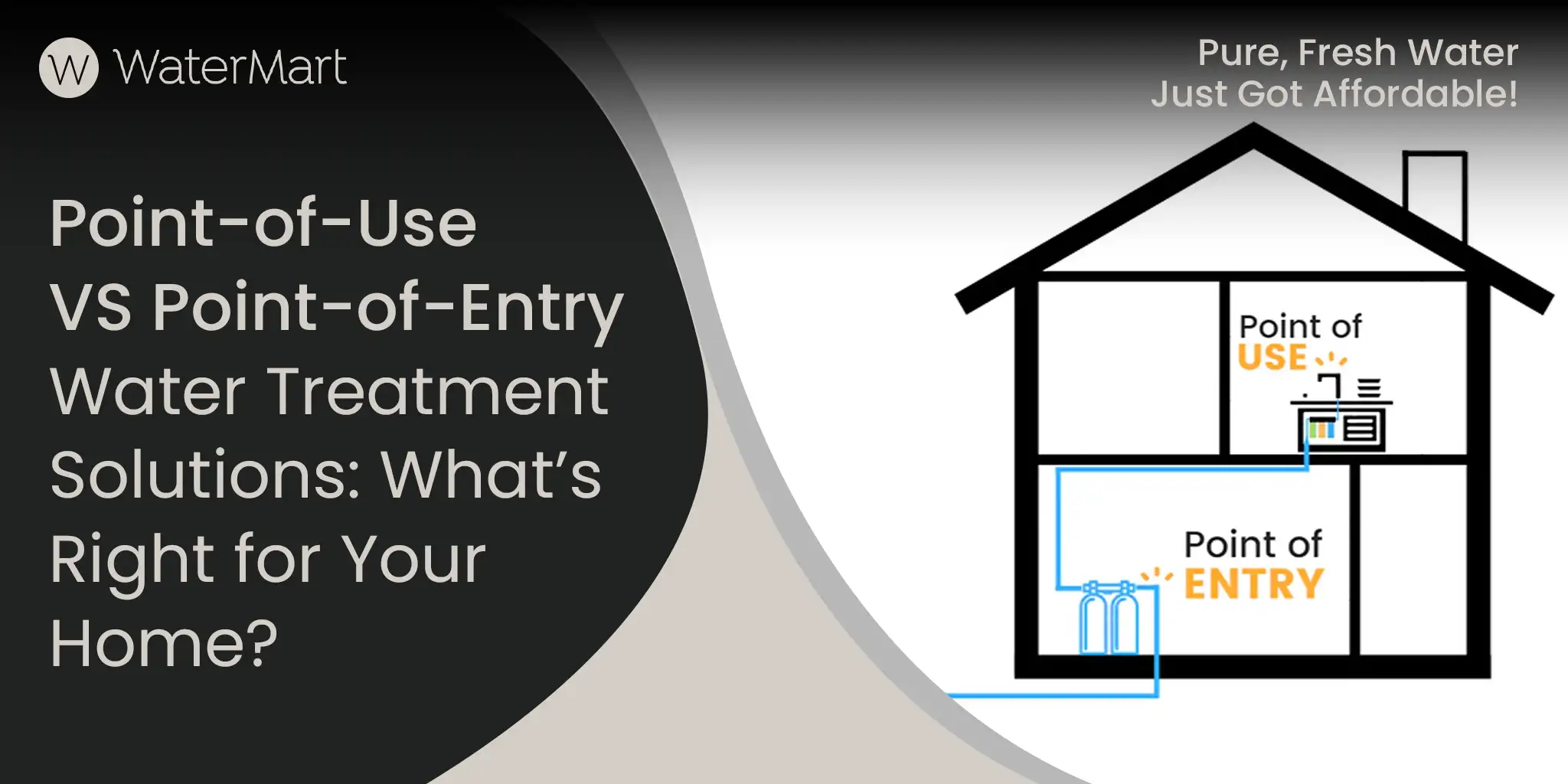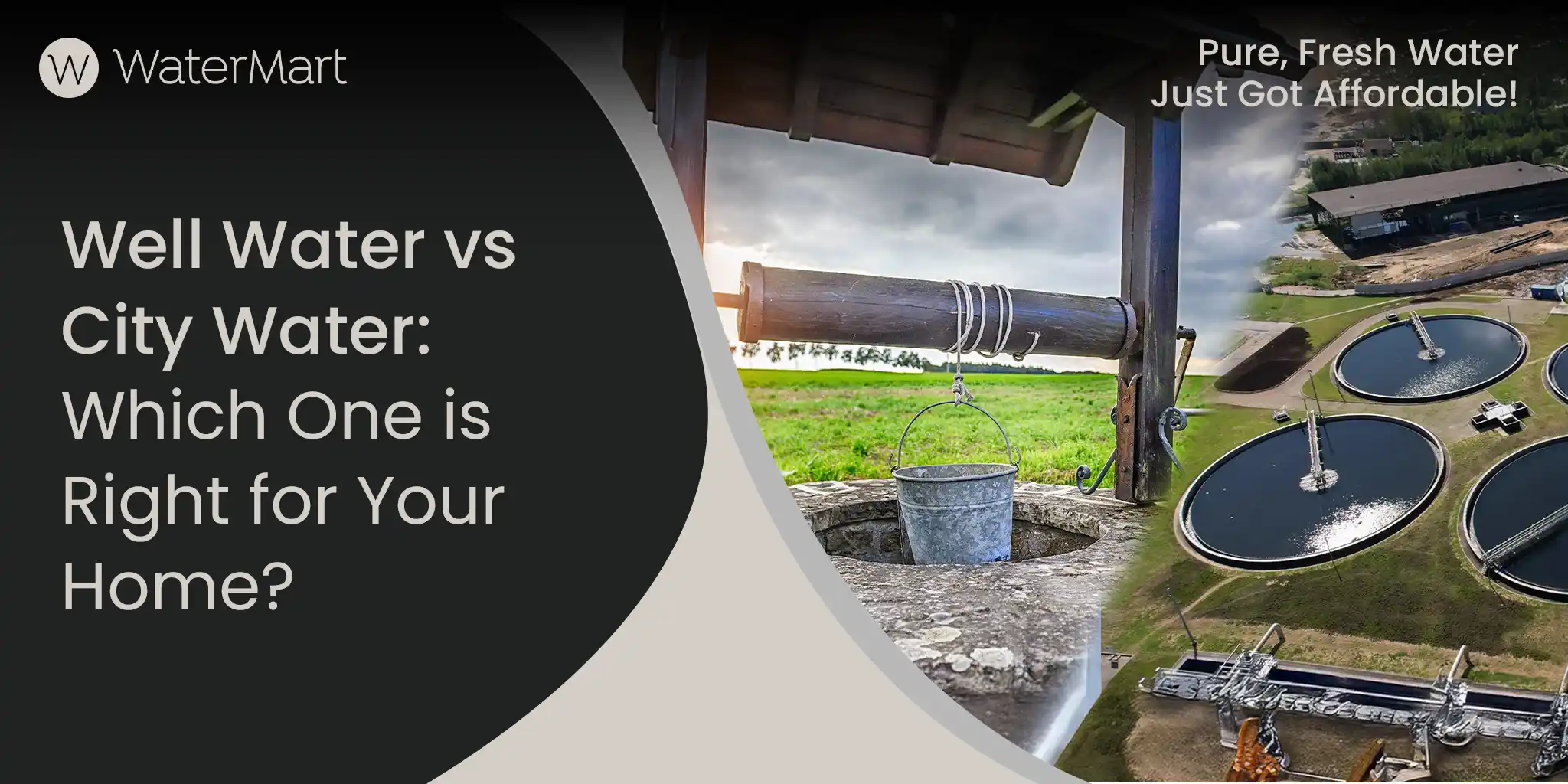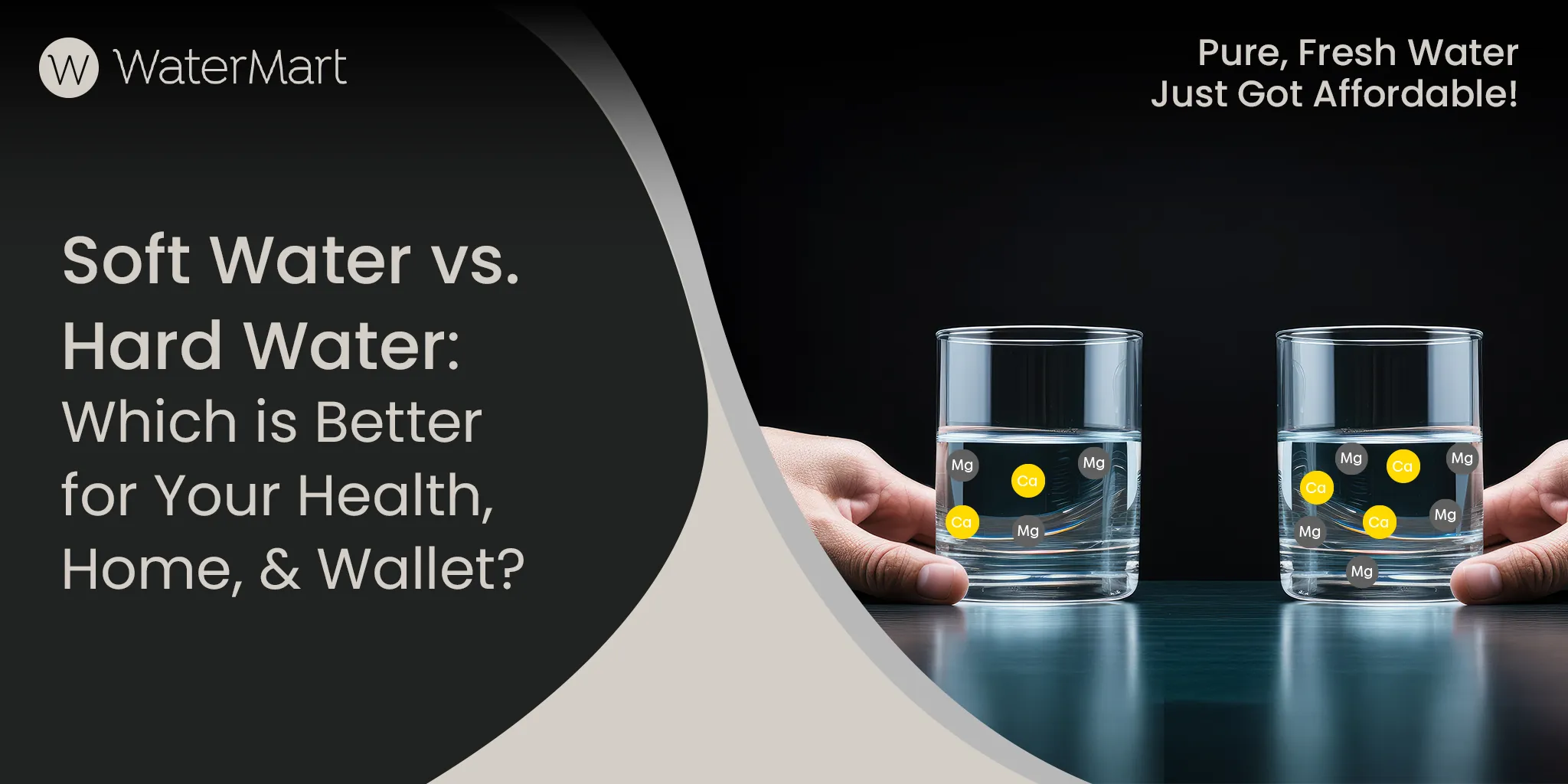Your cart is currently empty!
Distilled Water VS Filtered Water: What’s Better For You?
We all hear one thing constantly: “drink more water!” and “stay hydrated!”. Yet this common health narrative fails to explain which type of water offers the best results. In Canada, what flows from your tap might look clean, but it can contain trace contaminants, additives, or minerals that affect your health and taste preferences.
To address these potential tap water concerns, many explore purified options, primarily filtered and distilled water. Understanding the fundamental differences in these processes and the resulting water composition is key. Here we will evaluate how filtered and distilled water stack up against each other regarding health impacts, everyday practicality, and overall value. Let us help you determine the most suitable water choice for your situation.
What Is The Difference Between Filtered Water And Distilled Water
So, while both processes deliver water cleaner than the tap, the crucial difference lies in what remains. They both provide purified forms of H₂O, but they’re not the same. To see how these distinct outcomes translate in practice, we’ve added a breakdown of both procedures side-by-side:
| Feature | Filtered water | Distilled water |
| Purity level | High, depending on method (RO, water softener, etc.) | Extremely high, nearly 100% pure H2O |
| Mineral content | Retains essential minerals like calcium and magnesium | Removes all minerals, including healthy ones |
| Taste | Clean and naturally refreshing | Flat or bland due to a lack of minerals |
| Common Uses | Daily drinking, cooking, coffee, and household use | Medical devices, CPAP machines, batteries, and some infant formulas |
| Cost | Lower upfront and maintenance (filters) | Higher due to energy use and equipment cost |
| Health Impact | Safe, maintains electrolytes and mineral balance | Safe short-term, but lacks minerals for long-term hydration |
| Availability | Easy, via home water filtering systems or bottled options | Less accessible, usually store-bought, or limited home production |
What is Distilled Water And the Distillation Process?
Distilled water is one of the purest forms of water that contains pure water without any impurities, obtained through a process called distillation. The distillation is an age-old method dating back to ancient civilizations around 200 AD. Being an early desalination experiment, it was used to make seawater drinkable. Today, it’s used in laboratories and medical fields for its extreme purity.
The process starts by heating tap water or stream water to its boiling point. As it turns to steam, it leaves behind most toxins, minerals, and heavy impurities. That steam is then cooled, collected, and condensed into clean, liquid water.
Because evaporation only carries pure H₂O, the resulting distilled water is free from almost everything, including nutrients, metals, and inorganic compounds. What you’re left with is highly purified water, measured in extremely low parts per million of contaminants (0.5 ppm). It’s commonly used in machines, medical equipment, and situations where mineral buildup must be avoided. Small-scale DIY water distillers exist, but they can be slow due to low flow rates.
What Minerals Are Extracted From Water By Distillation?
The distillation process removes almost everything that isn’t H2O. While the results are of very high purity, they also strip out elements that may offer health benefits. Here’s what it takes out:
- Microorganisms: A key benefit here is safety from germs. That’s because distillation 100% gets rid of all bacteria, viruses, and parasites (like cryptosporidium) by simply boiling the water. Eliminating them aids in the prevention of waterborne infections.
- Contaminants: Distillation removes harmful substances such as nitrates, pesticides, and volatile chemicals(VOCs). By doing so, it reduces chemical exposure for pregnant women and infants.
- Chlorine: Tap water is primarily disinfected with chlorine. Even that is removed during condensation and evaporation for distilled water. Removing it improves both the taste and smell of the water.
- Additives: For health reasons, minerals like calcium and magnesium are added to ordinary drinking water; distillation removes them completely. It’s done to reduce mineral buildup in appliances, but it also strips out essential nutrients.
- Fluorides: Fluoride is added to prevent tooth decay. It’s removed during distillation. It’s not ideal if you rely on water as your source of drinking.
- Heavy Metals: Includes lead, arsenic, and mercury, all toxic in any amount. Distillation separates them effectively. It’s beneficial as it helps protect long-term health.
- Chemicals: The process clears out industrial by-products and household chemical traces that can make their way into water. These are not always visible but can be harmful over time if consumed regularly.
What are the effects of Distilled Water on Appliances?
Distilled water can extend appliance lifespan. How? Since it’s free from minerals like calcium, magnesium, and others, there’s nothing in it that can cause scaling buildup and clogging. That’s why many people and businesses go for distilled water for appliances.
You can use it in machines that are highly sensitive to limescale and mineral buildup. Many people use it in humidifiers, medical machines, and CPAP machines. Many CPAP device manuals even specify it for warranty compliance. That’s because only distilled water keeps the internal components of appliances clean. This helps reduce wear, improve performance, and prevent damage over time.
A home water filtering system can reduce sediment, but only distillation strips water of minerals entirely. Using filtered water in a CPAP machine can cause issues, as filtered water still carries hard water particles and trace metals. Distilled water is the best option.
Can I Use Distilled Water For Drinking And Daily Chores?
Using distilled water for drinking daily isn’t recommended; that’s because it’s too “clean,” and that purity ends up lacking beneficial minerals like calcium, magnesium, and potassium. The pH of distilled water is slightly acidic and can affect how your body absorbs minerals. It doesn’t shift blood pH, but it might stress the system over time. Overuse may even raise risks like tooth decay and enamel wear, especially in kids.
The flat taste is noticeable. Distilled water strips flavor instead of enhancing it. Soups, coffee, and tea often lose depth and complexity because no minerals remain to support proper extraction. The result is a muted or “empty” flavor profile.
What’s the best use? Distilled water is practical for daily chores like rinsing produce or cleaning. It’s also great for appliances if you want to skip mineral residue without relying on a full home water filtering system. But for cooking and drinking, mineral-rich options offer better flavor and nutritional balance.
What is Filtered Water And The Filtration Process?
Filtered water is tap water that’s been processed to reduce unwanted elements, like chlorine, additives, and microscopic particles, without stripping away every mineral. Filtration system types include activated carbon systems, reverse osmosis, and micron filtration. All of these work by pushing water through materials that trap “specific” contaminants based on size or chemical structure.
Activated carbon filters absorb chemicals and odors. Micron filtration blocks particles above a certain size. And reverse osmosis removes most dissolved solids by forcing water through a semipermeable membrane. Each system targets specific impurities but may retain some minerals for taste and balance.
Most Reliable Ways to Purify Your Water Through Filtration
All of the filtration methods eliminate unwanted additives and metals, but they differ when it comes to minerals. They remove and retain specific minerals. Below are three widely used systems that target specific concerns. Contact WaterMart today, and we’ll help you choose and install the best water purification system based on your needs and water quality.
Reverse Osmosis
A Reverse osmosis system pushes water through a tightly woven membrane, removing nearly all dissolved solids. It reduces contaminants to just a few parts per million. It is the best for removing solid particles like nitrates, heavy metals (lead), and bacteria. Removing nearly all minerals leaves highly purified water that’s also mineral-free. Ideal for homes with high contaminant levels or compromised taste.
Water Softeners
Water softeners filter the water using the ion-exchange process. It’s done by replacing calcium, magnesium, and other hardness minerals with potassium or sodium ions. The result? No limescale, better appliance efficiency, and fewer mineral stains. This system doesn’t filter chemicals or microbes, it’s built to target hard water alone.
Water Filters
Standard water filters, such as activated carbon systems, use porous media to target chlorine, sediment, and everyday additives. While they don’t remove everything like reverse osmosis systems, they preserve beneficial minerals and noticeably improve taste and odor. These filters work well in homes where municipal water is already treated but needs fine-tuning for daily use.
WaterMart offers expert-guided setups for all three, based on your water quality, so book a test today!
Filtered Water for Everyday Use: Real-Life Scenarios!
| Use Case | Best Water Type |
| Drinking | Filtered |
| Cooking | Filtered |
| Showering | Filtered |
| Everyday chores | Filtered |
| CPAP or medical machines | Distilled |
| Humidifiers | Distilled |
| Irons | Distilled |
| Emergency Kit | Filtered or Distilled |
| Baby Formula | Distilled |
| Car batteries/ car cooling system | Distilled |
| Aquariums | Filtered |
| Lab use | Distilled |
Is Water From The Fridge Distilled?
No. Fridge dispensers use basic filters, not distillers. Most rely on filters like activated carbon only to reduce chlorine and odor. They don’t remove minerals or dissolved solids. That means the water is filtered, not distilled, fine for drinking, but not suitable for devices like CPAP machines or steam irons.
Is Bottled Water Distilled?
Some is, most isn’t. Bottled water can be from a spring, or it could be filtered, purified, or distilled, depending on the treatment. Only a few brands sell true distilled water, and it’ll say so clearly on the label. Only bottles marked distilled have gone through the full evaporation and condensation process.
Is There A Substitute For Distilled Water?
Yes, but again, not always. Reverse osmosis or deionized water is are good alternative for general use. They’re clean enough for drinking, cleaning, and humidifiers. But for lab work, medical equipment, or anything that builds up scale, you’ll still need actual distilled water.
Is Purified Water The Same As Distilled Water?
No. Know that while distilled water is purified, not all purified water is distilled. It’s just one of the procedures of getting purified water. Distillation (boiling water to steam, then collecting it) removes nearly all minerals. But other methods remove contaminants from water for purity. For drinking, both can be used. But for CPAPs, humidifiers, or lab use, only distilled water is pure enough to prevent mineral buildup.
Busting Common Myths About Distilled & Filtered Water!
Misinformation about water quality is common. Here, we’ll set the record straight on some frequent misconceptions regarding distilled and filtered water:
“Distilled is always healthier.”
This is wrong. The distillation process removes beneficial minerals like magnesium, potassium, and calcium along with impurities. So, it’s not always healthy to take and can cause electrolyte imbalance, fatigue, or nutrient deficiencies.
“All filters remove everything.”
Filter capabilities vary widely. Standard filters effectively reduce things like chlorine taste and sediment, but typically leave essential minerals intact. More advanced systems like reverse osmosis remove more, but basic filters don’t strip water completely, which is often preferable for drinking water.
“Boiled water is just like distilled.”
Boiling sterilizes water by killing pathogens only. But if you’re asking, “Is distilled water the same as boiled water?– the answer is no. Boiled water doesn’t remove chemical pollutants, heavy metals, or hard minerals. Distillation removes most of these through vaporization and condensation. Boiling disinfects, whereas distillation purifies more thoroughly.
“Filtered water works for anything.”
Not always. While great for drinking, filtered water contains minerals that can build up and damage sensitive equipment like CPAP machines, steam irons, or humidifiers. In these cases, only distilled or reverse osmosis water is appropriate.
Book Your Free Water Assessment Today!
Not sure which system to pick for your home? Let WaterMart help you make the right choice. From reverse osmosis systems to water softeners and standard filters, our experts assess your water and recommend the most effective solution. Take advice based on real conditions, not guesses. Our free, commitment-free service gives you clear answers without spending money. We’ll assist you in understanding your options, regardless of your concerns regarding contaminants, taste, or minerals.
Schedule your water test today and get expert insight tailored to your needs.
Take Away
There’s no one clear water process, as you can get pure water from different procedures. Distilled water is highly purified; it takes away all minerals. On the other hand, filtered water retains essential nutrients; it isn’t 100% pure. However, choosing the right system isn’t just about taste or a purity test, it’s about a long-term health decision. In that case, filtered water is the best.
Take action and book a free test today, as untreated or poorly filtered water has been linked to serious health conditions, such as neurological diseases, certain forms of cancer, and hormonal imbalances such as infertility, early puberty, and premature labor.
